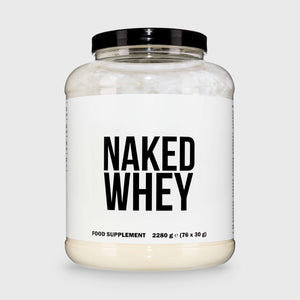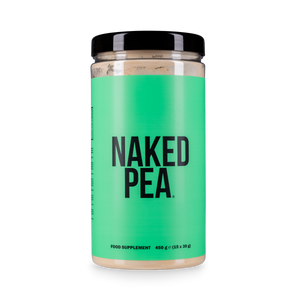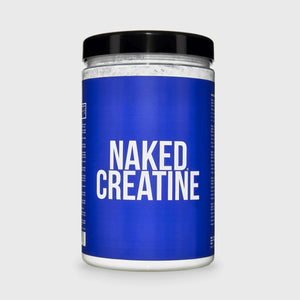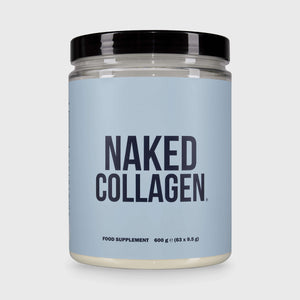Disclaimer: This article is for informational purposes only and does not constitute medical advice. Always consult a healthcare professional before starting any new supplement regimen.
When it comes to picking the best supplements for muscle growth, creatine has become one of the universal top picks (Kreider et al., Journal of the International Society of Sports Nutrition, 2017).
And there's research to back it up: studies have found that creatine supplements help build muscle and improve recovery after strength training workouts (Journal of Strength and Conditioning Research, 2020).
Creatine HCL and Monohydrate: The Two Heavyweights

However, choosing the best creatine supplement for muscle growth has become increasingly confusing because as creatine use among everyday athletes increases, so does the market size.
There are now not only dozens of supplement companies manufacturing creatine products, but also different types of creatine supplements available.
The two most common types of creatine found in the different forms of creatine (creatine powders, creatine gummies, creatine capsules, etc.), are creatine monohydrate and creatine HCL.
So, what are the pros and cons of creatine HCL vs monohydrate? Is creatine HCL better than creatine monohydrate for muscle growth? Keep reading to learn how to pick between using creatine monohydrate or creatine HCL supplements.
What is Creatine and Why Does It Matter?
Creatine is a natural compound produced by the body and found in certain foods (Mount Sinai Health Library, 2023).
It is chemically classified as a nitrogenous organic acid and not a specific type of protein. This can be confusing because creatine is composed of amino acids and amino acids are the building blocks of protein.
The three constituent amino acids in creatine are L-arginine, glycine, and L-methionine.

Creatine Production Breakdown:
- Approximately 50% produced naturally by the liver, pancreas, and kidneys (National Institutes of Health, 2022)
- Remaining 50% comes from diet, primarily protein-rich foods
In the body, creatine exists as phosphocreatine, also called creatine phosphate. This is essentially just the creatine molecule bonded to a phosphate molecule.
High school biology buffs might recall that ATP, the "energy" molecule in the body, is the shortened name for adenosine triphosphate. Notice the similar -phosphate component. This is actually important and speaks to one of the key roles of creatine phosphate in the body.
Creatine is primarily used by muscle cells to generate energy for rapid force production such as lifting heavy weights or jumping (Sports Medicine Open, 2018).
As such, 95% of the creatine in the body is stored in skeletal muscles, with the remaining 5% found in the brain.
How Creatine Fuels Muscle Energy
Creatine is a key molecule in the ATP-PC (or phosphocreatine) energy system (International Journal of Sport Nutrition and Exercise Metabolism, 2019).
This energy system produces ATP, which is the form of energy your muscle cells use to do work.
Moreover, although there are several reactions that produce ATP for muscle cells, the phosphocreatine system is the one that produces energy the fastest.
Therefore, this energy production system is the predominant one for maximum-intensity, high-velocity, high-power exercise such as lifting heavy weights or sprinting short distances.

Benefits of Creatine for Strength, Recovery, and Performance
Although the ATP-PC system produces energy extremely rapidly, doing so uses up muscle creatine stores quickly.
Then, it takes time for the muscles to "restock" or replenish creatine before the muscles can eke out additional reps or sets with the same intensity.
Moreover, the body needs to have ample creatine in circulation for the muscles to take up and use to produce more energy.
This is why creatine supplements can be beneficial for weightlifters or other power athletes looking to maximize intensity in their workouts (Journal of the International Society of Sports Nutrition, 2020).
The good news is that studies have found that creatine supplements can increase muscle creatine concentration.
Suppose you have more creatine in your body. In that case, your muscles will be able to recover and replenish the ATP-PC system more times during a workout before fully depleting the available creatine.
This can enable you to lift heavy weights or perform high-intensity exercises for more sets in a given workout.
Performance Enhancement Evidence:
- Increases muscle creatine concentration
- Enables more sets and reps during workouts
- Improves muscle recovery
- Potentially enhances muscle hydration

Additionally, creatine supplements cause the muscles to take up more water, which is why some people find that they gain some "weight" when they first start taking creatine.
Note that this is predominantly water weight, and it may have training benefits: better hydrated muscles can potentially improve functional performance (Sports Medicine, 2017).
Creatine Monohydrate – The Gold Standard
Creatine monohydrate is the most well-researched form of creatine, so it can be considered the "gold standard" for creatine products (Examine.com Supplement Guide, 2022).
To date, creatine monohydrate supplements have been studied much more thoroughly than any of the other types of creatine, including creatine HCL.
This means that most of the evidence-based benefits of creatine and the recommended dosage instructions are based on creatine monohydrate supplements.
Creatine monohydrate products also tend to be cheaper and more readily available than creatine HCL.
However, creatine monohydrate increases water retention—or total body water—which can make you feel bloated and can temporarily increase your weight. The reason this happens is because creatine affects the osmolality inside versus outside of the muscle.
If you can think all the way back to high school science classes, you might recall that fluids in the body can travel via osmosis—from areas of high concentration to low concentration.
Creatine monohydrate has one water molecule bonded to creatine (mono- for one and -hydrate for H2O).
Therefore, when creatine is taken up by muscle cells, they hold more water and the body retains more water in circulation to restore the balance of various ions in the fluids inside and outside the muscle.
Some individuals are more bothered by this bloating, and may also experience gas or other digestive symptoms.
Note that the side effects of creatine tend to resolve after the loading phase.

Pros of Creatine Monohydrate:
- Most researched creatine form
- Proven effective for muscle growth
- Cost-efficient
Cons of Creatine Monohydrate:
- Can cause bloating
- Potential minor digestive issues
Creatine HCL – A Newer Alternative

As discussed, creatine monohydrate has one water molecule bonded to creatine.
In contrast, creatine HCL, also known as creatine hydrochloride, does not have this water molecule attached.
Instead, there is a hydrogen atom bonded to a chloride atom.
The hydrochloride component is smaller than the water molecule and by default, not aqueous.
This means that creatine HCL can potentially be more potent than creatine monohydrate, so lower dose or serving sizes of creatine HCL may potentially provide similar results as higher doses of creatine monohydrate (Nutritional Supplements Research, 2021).
Creatine HCL is also more soluble than creatine monohydrate, which means that it dissolves faster in the body.
However, this doesn't necessarily mean creatine HCL is absorbed faster; further research is needed.
However, more importantly, without the water molecule attached to creatine HCL, bloating and water retention may be less pronounced with creatine HCL vs. creatine monohydrate.
Therefore, creatine HCL can potentially be an attractive alternative to creatine monohydrate for athletes who experience side effects with high doses of creatine.
However, to date, the majority of studies with creatine HCL have been performed with animals, so there is still not enough information to conclusively determine if creatine HCL is better with them.
Even though creatine monohydrate has been studied far more extensively than creatine HCL, most nutritionists and researchers believe that creatine HCL supplements should provide the same benefits and relative efficacy as creatine monohydrate.
Pros of Creatine HCL:
- Greater solubility
- Lower dosage requirement
- Reduced bloating potential
Cons of Creatine HCL:
- Less research compared to monohydrate
- More expensive
Performance & Muscle Growth: Does One Work Better?

An older review that compiled the findings of 22 studies investigating the performance and strength benefits of creatine supplementation when combined with resistance training found that creatine increased maximum muscle strength by an average of 8% more than taking a placebo (Journal of Strength and Conditioning Research, 2018).
Note that these studies saw an average of 20% improvement in 1RM, 3RM, or 10RM for those taking creatine monohydrate and lifting weights vs. 12% improvement in individuals just doing the training program without supplementation.
Additionally, creatine monohydrate increased the number of reps and sets the subjects could train in a session (training volume) relative to controls.
Creatine monohydrate allowed for an average of 14% more reps for an exercise at a given intensity (26% more in the creatine group vs. 12% in the control group).
These results indicate that creatine supplements can increase strength and prevent muscle fatigue, allowing for more training.
As mentioned, the vast majority of all studies on the effects of creatine in the body have been conducted with creatine monohydrate.
Therefore, most of the documented benefits of creatine for muscle growth are based on doses of creatine monohydrate.
That said, some studies have compared creatine HCL to creatine monohydrate and found similar benefits with both forms.
A recent study looked at the effects of taking creatine-hydrochloride versus creatine monohydrate supplementation alongside a resistance training program (Nutrition Research, 2021).
Researchers measured changes in anabolic/catabolic hormones (such as testosterone, growth factor, and cortisol), strength, and body composition over the eight-week study.
The results revealed that the subjects in groups taking either form of creatine experienced positive improvements in muscle strength, muscle size (cross-sectional area), lean body mass, and anabolic hormones compared with controls not taking either form of creatine.
Those taking creatine also had decreases in cortisol and other hormones that can impede muscle growth.
However, there were no significant differences between the benefits of creatine monohydrate vs. creatine HCL or vice versa.
In contrast, another study published in Food and Nutrition Science examined the strength and body composition changes in subjects taking either creatine HCL or creatine monohydrate for four weeks while participating in a resistance training program.
The study group included a total of 40 subjects who were divided into four groups. One group took 5 grams of creatine monohydrate per day. One group took 5 grams of creatine HCL per day. One group took only 1.5 grams of creatine HCL per day. One control group took 5 grams of resistant starch per day.
While all of the groups taking some form of creatine saw increased strength relative to the control group, only subjects taking creatine HCL had positive effects on body composition.
Fat mass decreased in both creatine HCL groups but lean body mass only increased in the group taking the higher dose of creatine HCL.
These results suggest that when taken in equal amounts, creatine HCL might be more effective than creatine monohydrate.
However, far more research is needed to provide conclusive results as to whether creatine HCL is truly "better" than creatine monohydrate.

Cost Comparison: Is HCL Worth the Extra Money?
Prices for any type of creatine supplement will depend on the brand, formulation, quality of the product, form, and number of servings.
If creatine HCL is more potent, effective doses are likely smaller.
Some sports nutritionists and training professionals also suggest that a loading phase isn't necessary with creatine HCL.
Therefore, when buying creatine supplements, you should read the product information for the dosing instructions and compare not just the cost of the product overall, but the cost per serving of creatine monohydrate vs. creatine HCL.
Keep in mind that the best creatine supplements are those that contain no additional fillers or byproducts.
Premium creatine supplements may cost more money per serving but they are more effective and less likely to cause side effects.
Which One Should You Take? Final Verdict
Creatine HCL and creatine monohydrate supplements are generally best for recreational and competitive athletes who engage in high-intensity training or activities requiring explosive power.
This is because creatine in muscles is rapidly depleted during all-out, explosive exercise.
Taking creatine can help replenish muscle creatine stores during high-intensity workouts, enabling you to do more reps and more sets.
This can accelerate muscle growth and strength gains because the training volume of your workouts will be greater.
In general, either form of creatine will work well for most individuals.
However, if you are on a budget, creatine monohydrate may be a better option because it tends to be somewhat cheaper.
If you have a sensitive digestive system or experience bloating, gas, or cramping from creatine monohydrate, creatine HCL may be a better option. It offers the same performance benefits but likely causes fewer side effects.
Equally important as deciding between creatine monohydrate vs. creatine HCL is choosing a clean, minimally-processed creatine supplement with transparent labeling and no artificial colors or sweeteners.
Disclaimer: This article is for informational purposes only and does not constitute medical advice. Always consult a healthcare provider before starting any new supplement regimen.
References:
- Kreider et al., Journal of the International Society of Sports Nutrition (2017)
- Journal of Strength and Conditioning Research (2020)
- Mount Sinai Health Library (2023)
- National Institutes of Health (2022)
- Sports Medicine Open (2018)
- International Journal of Sport Nutrition and Exercise Metabolism (2019)
- Sports Medicine (2017)
- Examine.com Supplement Guide (2022)
- Nutritional Supplements Research (2021)
- Nutrition Research (2021)










